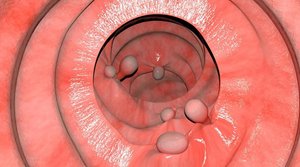There are a number of reasons—ranging from embarrassment, to discomfort, to fear of results, or even the cost—that prevent people from getting a colonoscopy, but there is one big reason in favor of going through the procedure: a colonoscopy is the best way to detect colorectal cancer in its early stages or prevent it altogether.
According to the World Health Organization (WHO), cancer is the leading cause of death worldwide. And, after breast and lung cancer, colorectal cancer is the 3rd most common cancer, and the 2nd most likely to lead to death, in both the world and in the United States. Put another way, the lifetime risk of developing colorectal cancer is roughly 1 in 23 for men, and 1 in 26 for women. Indeed, the American Cancer Society estimates that in 2023, 106,970 new cases of colon cancer, and 46,050 new cases of rectal cancer, will be diagnosed in 2023 alone.
How does colorectal cancer develop?
The colon and the rectum are both parts of the large intestine—the colon is (approximately) the last 5 feet of the large intestine, while the rectum is the final 5 or 6 inches of the colon, which then connects to the anus.
Colorectal cancer almost always develops from abnormal precancerous growths in the colon and rectum called polyps. According to the American College of Gastroenterology, polyps grow on the inner lining of the large intestine, often have a raised appearance, and "may be scattered throughout the colon and vary in size from a few millimeters to several centimeters."
 Polyps are pretty common—roughly half of all individuals over the age of 50 will develop polyps, with prevalence increasing as we age. Approximately 10% of polyps will progress to an invasive cancer. This process usually occurs over years to decades, with the likelihood that a polyp will become cancerous increasing as it grows in size.
Polyps are pretty common—roughly half of all individuals over the age of 50 will develop polyps, with prevalence increasing as we age. Approximately 10% of polyps will progress to an invasive cancer. This process usually occurs over years to decades, with the likelihood that a polyp will become cancerous increasing as it grows in size.
What are the symptoms of colorectal cancer?
Colorectal cancer can cause a variety of symptoms, and as a tumor grows, symptoms can include:
- Blood in the stool—or rectal bleeding
- Changes in bowel habits—such as diarrhea or constipation that last for more than a few days
- Stools that are narrower than usual
- Abdominal pain, cramping, or discomfort
- Weakness or fatigue
- Unexplained weight loss
- Anemia
Why is it important to detect colorectal cancer early on?
Per the American Cancer Society, colorectal cancer has 4 stages:
-
In situ: Cancers that have not yet begun to invade the wall of the colon or rectum
-
Local: Cancers that have grown into the wall of the colon or rectum, but have not extended through the wall into nearby tissues
-
Regional: Cancers that have spread through the wall of the colon or rectum and have invaded nearby tissue, or that have spread to nearby lymph nodes
-
Distant: Cancers that have spread to other parts of the body, such as the liver or lung
Overall, the survival rate for colorectal cancer is 64%—that is, 64 people out of every 100 that develop colorectal cancer will survive up to 5 years after the disease is first detected. While those numbers are fairly reassuring, what's more reassuring is that if detected early on—in either the in situ or localized stage of the disease—the survival rate is 90%.
Unfortunately, as the disease progresses to the regional and distant stages, the 5-year survival rate drops to 71% and 14% respectively. The problem is, many people with the disease don't experience symptoms in the early stages, and because polyps can take 10 to 20 years to become cancerous, people often have no idea they have colorectal cancer until it has progressed into the latter two stages.
This is the reason getting a colonoscopy is so important—screening for the disease before you have symptoms greatly increases your chances of survival should your doctor find a cancerous polyp.
What is a colonoscopy and how does it work?
 A colonoscopy is a crucial screening test that helps detect colon cancer and other colon issues by allowing for a direct visualization of the inside of the large intestine and rectum, enabling the doctor to identify and remove any polyps or abnormal tissue before they become cancerous.
A colonoscopy is a crucial screening test that helps detect colon cancer and other colon issues by allowing for a direct visualization of the inside of the large intestine and rectum, enabling the doctor to identify and remove any polyps or abnormal tissue before they become cancerous.
During a colonoscopy, the patient lies on their left side and a flexible tube with a tiny video camera at its tip—called a colonoscope—is inserted into the rectum. This allows the doctor to view the inside of the colon and look for abnormalities and polyps. In addition to the video camera, the colonoscope is equipped to remove polyps or abnormal tissue that is found, as well as take biopsies (tissue samples), which can be sent to a lab for analysis.
"Colonoscopy is a common procedure and the technology has advanced greatly in recent years," says Dr. Shaun Melarvie, surgeon at Door County Medical Center Surgical Services. "The surgeons at Door County Medical Center have been performing this procedure for more than 30 years, with excellent results," he says, adding, "Our polyp detection rate is greater than the national standard."
Typically, a colonoscopy lasts between 20 to 30 minutes. Patients generally opt for moderate sedation, which reduces pain and usually means there is no memory of the procedure. "Unlike most hospitals," Dr. Melarvie notes, "DCMC has full-time anesthesiologists who participate in the procedure and focus completely on the patient."
"I did choose to have a sedative," says Phil Beibel, who came to Door County Medical Center in 2021. "Just an IV in my arm," he recalls, "and and it worked so well, and so quickly," he continues, "that I don't even remember much more than being wheeled into the operating room and then waking up in the recovery room—absolutely no pain or discomfort! My entire time at the hospital was under three hours."
Who should get a colonoscopy?
There are several factors that can increase your risk of being diagnosed with colorectal cancer. The most common is age—the average age for a colon cancer diagnosis is 68 for men, and 72 for women, while the average age for a rectal cancer diagnosis is 63 for both men and women.
 It is recommended that most individuals get their first colonoscopy at age 45. If no precancerous polyps are detected, additional screenings every 10 years are also recommended. If you have an increased risk for developing colorectal cancer, such as a first-degree relative with a history of colorectal cancer, screening should start 10 years before the age of that first-degree relative's diagnosis.
It is recommended that most individuals get their first colonoscopy at age 45. If no precancerous polyps are detected, additional screenings every 10 years are also recommended. If you have an increased risk for developing colorectal cancer, such as a first-degree relative with a history of colorectal cancer, screening should start 10 years before the age of that first-degree relative's diagnosis.
Risk factors include:
-
Genetics: colorectal cancer runs in families. If someone has a family history of colorectal cancer diagnoses, his or her chances of receiving that same diagnosis doubles. Click here for more from the American Cancer Society on heredity and colorectal cancer.
-
Inflammatory bowel disease: diseases like Crohn's disease and ulcerative colitis increase the risk of developing colorectal cancer
-
Gender: men are more likely to receive a colorectal cancer diagnosis than women
Perhaps more importantly, around 55% of all colorectal cancers are attributed to lifestyle factors, which include:
- Insufficient physical activity—or sedentary lifestyle
- Obesity, or a BMI >30
- Unhealthy diet—in particular, eating red or processed meat
- High alcohol consumption
- Smoking
It is worth noting that, "numerous studies have shown that people with healthy lifestyle behaviors have a 27% to 52% lower risk of [colorectal cancer] compared to those without these behaviors."
•
While the death rate from colorectal cancer has been dropping in both men and women for several decades, in the past 20 years that decline has accelerated—a decline that is attributed to a "widespread uptake of [colorectal] screening with colonoscopy" that increased from 20% in 2000 to 61% in 2018 with adults ages 50 and over. Indeed, preventative measures work.
At Door County Medical Center, a colorectal screening isn't embarrassing or time-consuming, and a small amount of discomfort and a few hours of your day can save your life. As Dr. Melarvie notes, "The results are worth it—removing non-cancerous polyps is part of the procedure, and that goes a long way toward preventing colon cancer. A colonoscopy is a preventative strategy in contrast to the stool blood test and Cologuard, which are early detection strategies - the polyps have to be big enough to show up on the test. With colonoscopy, the polyps are detected before any of the other tests would likely turn positive."
To schedule a colorectal screening at Door County Medical Center today call 920-746-1060.